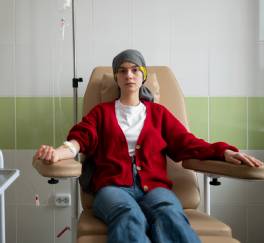 Book Appt.
Book Appt.
 Call Now
Call Now


Immunotherapy has revolutionised cancer treatment and given new hope to patients suffering from blood-related diseases such as multiple myeloma, leukemia and lymphoma. Unlike conventional treatments such as radiation and chemotherapy, which target both healthy and cancerous cells, immunotherapy targets only malignant cells using the body's immune system. This blog examines the methods, types, benefits, drawbacks, and possible future directions of immunotherapy in hematological disorders.
Understanding Immunotherapy
Immunotherapy is a type of biological therapy that stimulates or manipulates the immune system to recognize and eliminate cancer cells. The immune system is naturally designed to detect and remove abnormal cells, but cancer cells can evade immune recognition through a variety of processes, including expression of immune checkpoint proteins and modification of surface antigens.
Immunotherapy functions in this way:
Types of Immunotherapy in Hematologic Disorders
Several types of immunotherapy have been developed for the treatment of blood cancers, each with unique mechanisms of action.
Benefits
Immunotherapy has several advantages over traditional treatment methods:
Challenges and limitations
When it comes to treating blood-related illnesses, immunotherapy confronts several obstacles despite its encouraging potential:
Side effects
Immunotherapy for hematologic disorders might have side effects in patients that need to be carefully managed. Typical adverse effects consist of:
Future directions and innovations
The field of immunotherapy is growing rapidly, with ongoing research aimed at increasing efficacy, reducing adverse effects, and expanding treatment options. Next-generation CAR T cells, bispecific antibodies, checkpoint modulation combinations, and machine learning are some of the most interesting avenues for research.
Conclusion
Immunotherapy is a revolutionary advancement in the management of blood disorders, offering hope for improved quality of life and survival. Immunotherapy has the potential to completely transform the treatment of blood cancers, as it becomes more precise, efficient, and, with further research and development, available to patients around the world. Patients considering immunotherapy should discuss the benefits, risks, and available options with their health care practitioners to determine the appropriate course of action based on their particular situation and treatment goals. For information, visit SHALBY Sanar International Hospitals in Gurugram.
SHALBY Sanar International Hospitals provides extensive medical procedures backed up with our state-of-the-art technology and a team of highly qualified & experienced clinical experts.
Our doctors pen down their research findings and experiences from time to time. Their words provide deep insight into the latest techniques, technologies and other advancements in healthcare. It provides expert answers to all kinds of health questions for real-life issues.
VIEW ALL



.jpg)
Since the day of its foundation, SHALBY Sanar International Hospitals is committed to provide comprehensive healthcare services. It regularly organizes awareness programs in its premises and encourages outdoor healthcare activities and camps with an intent to put focus on preventive healthcare.
VIEW ALL